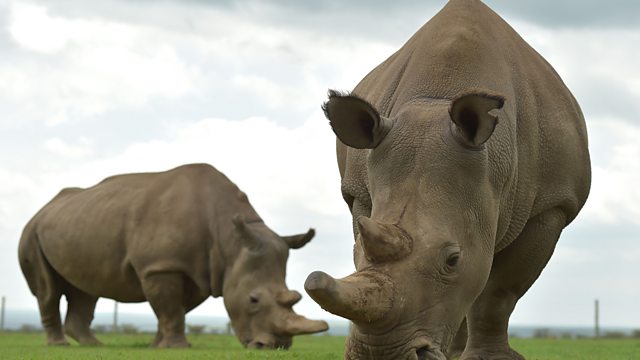Saving the Northern White Rhino
Bringing back the Northern White Rhino from extinction
Northern white rhinos are extinct in the wild and there are just two females in captivity in Kenya. Conservationists are working on an artificial breeding programme, using eggs from the females and sperm from a deceased male. Now five embryos have been created. Thomas Hildebrandt of the Leibniz Institute for Zoo and Wildlife Research in Berlin explained the research.
President Biden’s first executive order was what’s being called the hundred-day mask mandate. The day before the inauguration a massive analysis of mask-wearing and COVID rates demonstrated a clear, if small, benefit. Epidemiologist Ben Rader told Roland Pease that it got over 300,000 opinions by using the online questionnaire, SurveyMonkey.
After the alarming series of record-breaking heatwaves last year, global warming is causing specific problems in the innumerable lakes around the world. Lakes are ecologically particularly vulnerable to extremes. The European Space Agency’s Yestyn Woolway has been analysing past trends, and modelling the future.
2020 delivered a record year in hurricanes, which caused around $60 billion dollars in damage to the US alone, according to one estimate. A new technology called Airborne Phased-Array Radar promises to improve the measurements that are currently made by planes that fly right into the eye of the hurricanes, and make the missions safe. It’s being developed at the National Centre for Atmospheric Research and Roland discussed the new technology with the Director of NCAR, Vanda Grubišić.
And Covid-19 has prompted a cleaning frenzy. CrowdScience listener William works as a personal trainer in a gym, and while cleaning’s always been part of his job, it’s now taken over much of his working day. He’s constantly wiping down equipment and doing regular deep cleans, and he reckons he can sanitize his hands 40 times in one shift.
This kind of routine might strike a chord with many of us, and it’s certainly vital to take hygiene seriously during times of pandemic.
But could there be any downsides to all this extra cleaning? There’s a whole world of microbes out there: some, like SARS-CoV-2, make us sick, but others are essential for our health. A rich microbiome is linked to a healthy immune system, while ‘good’ microbes help keep ‘bad’ ones at bay. And what about the chemicals in cleaning products – do they have any unintended consequences for our health?
CrowdScience turns to the experts to ask whether our supercharged hygiene routines could damage our immune systems, or promote the spread of superbugs. And we hear why, as long as we have a good diet, plenty of fresh air, and ideally a furry pet, we don’t need to worry too much about being too clean.
(Image; Najin and Fatu, the only two remaining female northern white rhinos graze in their paddock. Credit: Tony Karumba/AFP via Getty Images)
Last on
More episodes
Previous
Next
Broadcasts
- Sun 24 Jan 2021 01:06GMT����ý World Service
- Sun 24 Jan 2021 16:06GMT����ý World Service News Internet
Podcast
-
![]()
Unexpected Elements
The news you know, the science you don't


